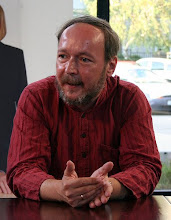
This Thursday I shall be interviewed for Bapu's Oral History Archive. My interviwer will be Puja Modi (picture).
The Oral Histories Archive is a small, but growing collection of people’s stories, testimonies, audio-visuals, personal narratives, case papers, photographs, letters, movement newsletters, campaign materials, audio-visual material and other arte-facts about emotional well-being and ill-health. The Archive stands as evidence of our profound experiences with mental well being, ill health and the diversity of our experiences with the mental health service delivery system in India.
Initially, when we started talking to people about an oral history archive of stories from persons subjected to psychological distress and to inhuman, degrading treatments, we had to face many questions. How can such persons share their stories? Will they remember anything? Can they talk rationally? Oh, well, they are too dangerous to talk to! Will their story be aesthetic enough? etc.
The marginalization of persons with a psychosocial disability from the mainstream human rights movements and intellectual currents was evident in such queries. There was also little recognition of the fact that often our entire personhood has been robbed off by many years of using brain damaging, health compromising, violent, and harmful psychiatric treatments. The memories of those who are surviving or have survived many “doses” of shock, with or without anesthesia, has been damaged to such a degree, that telling their story becomes difficult for them.
There were also questions about the human rights of persons with a psycho-social disability: Can “mentally ill” people have civil liberties or fundamental freedoms? Will they use it responsibly? Should there not be a guardian or a spokesperson? Etc. These questions came from very reasonable and intelligent people, people who were themselves highly effective social change agents and creators of culture in our society.
Our sisters and brothers inside lock ups, solitary cells and isolation wards, tied or chained to their cots, have sordid stories to tell about rights violations. Few of us, users and survivors of psychiatry, have lived to tell the tale of lives lived inside custodial institutions, and if we have survived, it has been at great cost to our creativity, skills and abilities.
The Oral Histories Archive validates our belief that those labeled with a “mental illness” have memories, histories, personal experiences and a coherent story to tell. The Oral Histories Archive is home to the collective memory of a set of persons otherwise erased from cultural, social and political history.
Initially, when we started talking to people about an oral history archive of stories from persons subjected to psychological distress and to inhuman, degrading treatments, we had to face many questions. How can such persons share their stories? Will they remember anything? Can they talk rationally? Oh, well, they are too dangerous to talk to! Will their story be aesthetic enough? etc.
The marginalization of persons with a psychosocial disability from the mainstream human rights movements and intellectual currents was evident in such queries. There was also little recognition of the fact that often our entire personhood has been robbed off by many years of using brain damaging, health compromising, violent, and harmful psychiatric treatments. The memories of those who are surviving or have survived many “doses” of shock, with or without anesthesia, has been damaged to such a degree, that telling their story becomes difficult for them.
There were also questions about the human rights of persons with a psycho-social disability: Can “mentally ill” people have civil liberties or fundamental freedoms? Will they use it responsibly? Should there not be a guardian or a spokesperson? Etc. These questions came from very reasonable and intelligent people, people who were themselves highly effective social change agents and creators of culture in our society.
Our sisters and brothers inside lock ups, solitary cells and isolation wards, tied or chained to their cots, have sordid stories to tell about rights violations. Few of us, users and survivors of psychiatry, have lived to tell the tale of lives lived inside custodial institutions, and if we have survived, it has been at great cost to our creativity, skills and abilities.
The Oral Histories Archive validates our belief that those labeled with a “mental illness” have memories, histories, personal experiences and a coherent story to tell. The Oral Histories Archive is home to the collective memory of a set of persons otherwise erased from cultural, social and political history.
The objectives of our Oral Histories Archive is multifold:
To bring before the reading public, the lives and experiences of persons who have been through a psycho-social disability, their stories of healing and recovery
To bring public visibility to the everyday violations of respect, personal dignity and human rights of persons with psycho-social disabilities
To contest and counter the harmful forces of psychiatry on the lives of users and survivors of psychiatry
To foreground the many thoughts and actions that we take on our own energies to help ourselves and people like us
To inspire and inform our activism and our work on policy, legal and human rights advocacy
To mobilize users of psychiatric services and other mental health care services in the local, regional and national context
To give substance and life context to our community publications on emotional well being
To serve as testimony of the poor and degrading quality of care experienced by users of the so-called modern institutions and mental health services in India
To provide a basis for the sustaining and life affirming quality of traditional healing practices, such as possession and trancing
We will share this invaluable collection with the community through our library and documentation center. We will also regularly publish documents, reports and try to bring them out in the form of publications and documentaries. We will mobilize user / survivor workshops and sharing groups to take our activism forward.

No comments:
Post a Comment